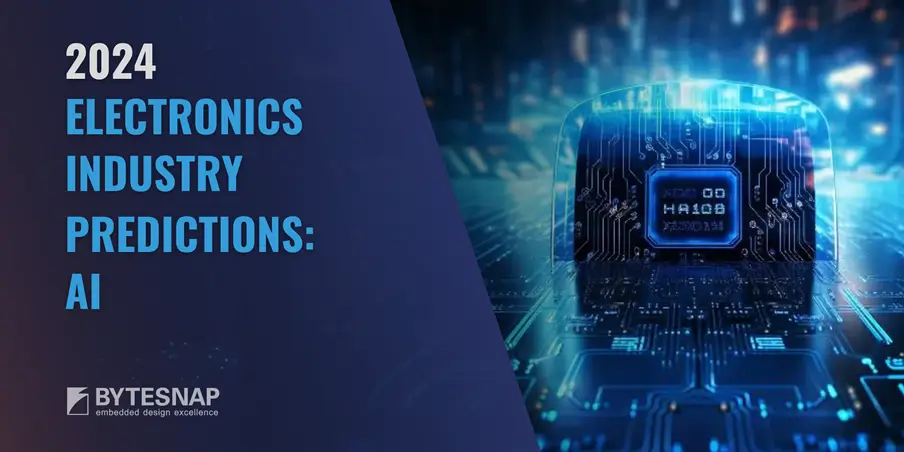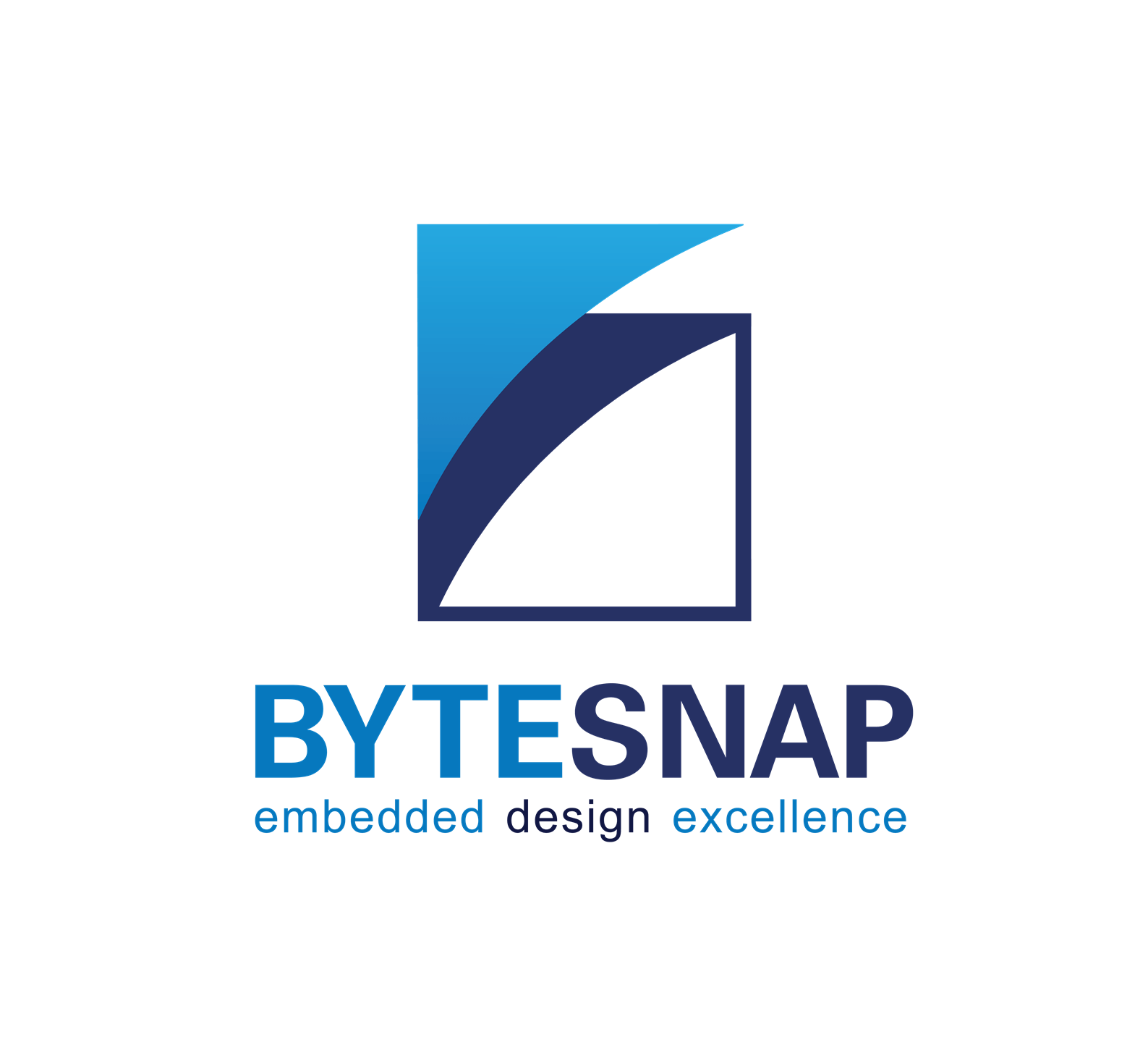2024 Electronics Industry Predictions from ByteSnap's Engineering Consultants
Happy New Year!
Read our 2024 electronics industry predictions – discover which AI trends are likely to disrupt the tech sector – including autonomous taxis and AI enabled-integrated circuits…
2023 was an eventful year in the tech sector, where AI went mainstream with the explosion of language learning models.
With advancements in artificial intelligence accelerating at an unprecedented pace, we stand at the cusp of a new era where AI’s influence extends beyond mere automation to become a cornerstone of innovation and efficiency.
The engineering team at ByteSnap Design has been reflecting on the future of AI in the technology and electronics design industries.
Here’s our forecast for the pivotal AI trends likely to emerge during 2024 to redefine industry standards and further push the boundaries of technology.

AI to trigger a battle of the Smart Assistants?
AI assistant tools will continue to be integrated into existing tools to make tasks easier. An example of this happening this year is Zoom’s AI companion which can summarise meetings into notes.

Expect to see development tools such as an IDE integration which can generate GIT commit notes, and release notes automatically during 2024.
We also predict companies will be trying to increase their profits with more monetisation from smart assistants such as Alexa and this will drive techy people towards open-source alternatives, such as Home Assistant which run locally.
Rise of the Robotaxi

We anticipate that the first un-geofenced electric Robotaxis will become operational and start accepting paying customers over the coming months.
This is likely to scale steadily over the next few years to replace Uber as the transport medium of choice, providing legal issues can be overcome.
Ultimately, this will make car ownership a questionable decision because travelling this way could be cheaper than running a car.
Apple to enter the Generative AI race
We look forward to Apple unveiling a product to join the AI arms race with its own large language model.
Currently, Apple is using artificial intelligence and machine learning in its iPhone and Apple Watch devices, as well as in its iOS operating system.
However, despite Apple reportedly spending millions of dollars a day on AI, other companies are embracing the technology faster and already implementing it; for example, Bard into Google Assistant and Microsoft’s push for AI in their Office 365 products.
Nevertheless, Apple has a stronger than most in-house development philosophy, and it seems determined not to be left on the side lines.
Expect announcements in late 2024 from Apple around its generative AI offering.
Further AI disruption for the Smart Home market
Expect to see more innovation in the smart home market as consumers continue to look for ways to reduce their energy bills, with smart thermostats and TRVs becoming ever more popular.
Nest is apparently trying to use AI to help understand consumers behaviour around energy consumption, and we anticipate that this trend will continue.
With Apple releasing their Pro Vision headset in 2024, we also expect to see some manufacturers trying to compete with a cheaper product.
Apple is excellent at design and is sometimes seen as a trendsetter, but in this case is quite late to the party – with Meta already well-established leaders.
However, Apple has a history of knocking out incumbent leaders, so this could be an interesting space to watch.
How much of a consumer appetite there is for this type of technology, however, remains open to question.
AI-enabled Integrated Circuits
We’re likely to see the greater emergence of AI on integrated circuits from companies such as Altered Carbon.
Computer chip manufacturers – Intel, for example – are incorporating AI cores into their CPUs.
AI algorithms, in our view, are mostly used for detection/categorisation. The classic example is using AI to detect whether an image contains a cat or a dog.
However, even the way that the likes of Tesla use AI is similar – detecting images of signs for speed limits or an image of the lines of the road – but the output differs in that it translates it into braking, accelerating or turning.
One of the projects we’ve worked on at ByteSnap sent accelerometer data into the cloud to detect people falling over.
We forsee a scenario where a fall detector algorithm could be generated by AI and embedded within the sensor device, so that a huge amount of data does not need to be sent, allowing the product to consume less power.
Greater AI in Supply Chain Management
AI-powered forecasting is providing businesses with intelligence to prevent mishaps in the future, overcoming demand-supply mismatches to prevent overstock or understock of inventory.

This minimises costs and improves the customer experience.
We expect to see more of this across 2024.
Additionally, AI-based algorithms are automating goods retrieval from warehouses for smooth order fulfilment, and AI-powered autonomous vehicles are reducing driver costs for delivery.
AI in software and electronics design
Software development and electronics design are both areas that AI vendors are targeting, as developers are expensive and timescales can be long.
We can see initially that the AI could be best at optimising PCB layouts on the hardware side, and writing generic functions within software, albeit with dubious copyright infringement.
The work of translating very abstract requirements into real electronics still seems a very long way off, though.
This is partly due to the lack of freely available models to train against in what is a fast-moving industry and little way for the circuits that are available to be assessed.
In addition, electronic engineering is actually quite a person-centred job; dealing with suppliers, customers, manufacturers, and colleagues.
So far, software AI trainers have raided github and ChatGPT was able to train linguistic models against the huge wealth of the World Wide Web.
However, for electronics, we expect it will take at least another generation of AI development before engineering jobs are threatened.
2024 Electronics Industry Predictions - Conclusion
2024 is shaping up to be a watershed year for AI’s proliferation across the electronics sector.
Companies that effectively leverage AI for enhanced productivity, efficiency, and innovation will gain a competitive edge.
While AI cannot wholly replace human ingenuity just yet – will it ever?? – its meteoric evolution look set to impact multiple industries and reshape the customer experience.
The boundless potential of AI and machine learning remain amongst the most intriguing frontiers in technology today.
Ready to incorporate AI into your product or system?

Founded in 2008, ByteSnap Design is an award-winning embedded systems design consultancy, offering a comprehensive range of services across the electronic product development lifecycle.
A highly skilled team of over 40 hardware and software engineers, our expertise spans several sectors, including IoT, automotive, industrial, medical, and consumer electronics.
The engineering consultants on the ByteSnap Editorial Team share their knowledge and practical tips to help you streamline your product development and accelerate designs to market successfully.
With their deep technical expertise and practical experience, they aim to provide valuable insights and actionable tips to guide you through the complex world of electronic product design and development, to help you bring innovative, reliable, and secure electronic products to market quickly and cost-effectively.




